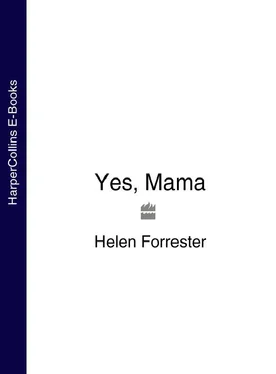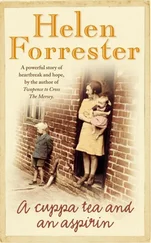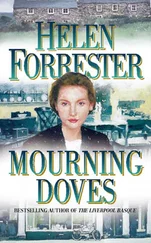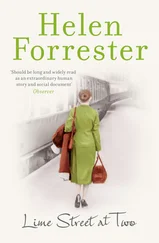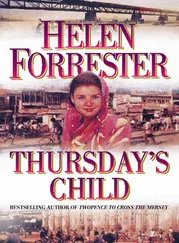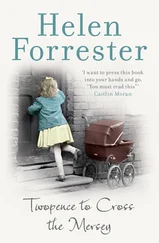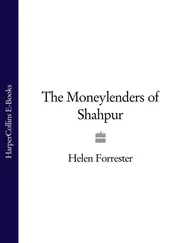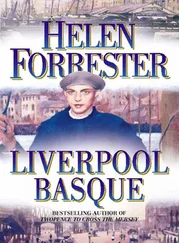‘He used to tan ’is sons’ hides with his razor strop,’ Rosie told Polly. ‘I remember Master Edward gettin’ it so hard once, he fainted. And even then he never lifted a finger against ’is Pa. Loovely young man, Master Edward is; always says “thank you”.’
Rocking the baby in her arms as she paused at the doorway of the bathroom she was not allowed to use, Polly remembered the dreadful state of Elizabeth’s back after she had been beaten and she wondered if he had used the strop on her. No one, she thought passionately, should use a strop on such a pretty lady, no matter what she had done. Since that day, she had more than once found her Mistress with tears on her face. She wondered what else he had done to her, and she shivered.
Elizabeth had no idea whether her husband had expressed any feelings in public about the new arrival in the family, but she suspected that Maisie had done so and that the news of Alicia’s doubtful origins had reached some of her acquaintances. Certainly, the number of invitations she usually received had dropped off, and one or two ladies appeared not to have seen her when she met them while out walking.
Her conscience told her that, as Andrew and she moved through their usual group before the birth, mutual friends must have sensed the attachment between them – and her pregnancy, at so late an age, must have caused speculation behind delicately waving ball fans.
She decided that she did not care; she would brazen it out. And Humphrey could take himself to hell, as long as he kept her. Once she had recovered from the beating, she had done some urgent arithmetic, and had decided that she could not possibly live on her marriage settlement from her father; it provided pin money, but that was all.
In her despair, she had considered writing to her brother in Ceylon and asking if she could make a home with him; but he had always been a poor correspondent and lived up country on his tea plantation, sharing a house with his partner. Two bachelors together, she thought wryly, would not want to be saddled with a woman. And it was said that men sometimes, well, sometimes did intimate things together – and she could not face the possibility of that.
So she decided to use Humphrey to her own advantage. If he threatened to beat her again, she would say sharply that she would show the bruises to the wives of his business associates. Stiff-necked Presbyterians, most of them, they might feel she deserved it, but faced with it, they would freeze out Humphrey. They’d be a pack of Pontius Pilates, she thought maliciously.
The armed truce prevailed, with occasional tiresome arguments which never resolved anything.
Though Elizabeth’s friends might snub her, Humphrey found, to his embarrassment, that when he met business acquaintances accompanied by their wives, several of the ladies inquired after Elizabeth’s health and whether the baby had been a boy or a girl.
The same thing happened when he attended social events alone. Where was dear Elizabeth and how was the new baby?
He knew he must, to save unwanted conjecture, persuade Elizabeth to accompany him occasionally, and he must learn to reply civilly to polite inquiries. He could not ignore both mother and daughter indefinitely. His Manchester brother, Harold, and his wife, Vera, had been offended at not being asked to the christening, and he had told them that it had been very quiet because Elizabeth was still weak and Florence was in the family way herself. Though his brother accepted this, Vera felt that it confirmed her own suspicions.
At St Margaret’s Church, Humphrey and Elizabeth stood side by side each Sunday morning in frigid silence. He hoped that she had been privately Churched, attended a traditional service of thanksgiving; otherwise, the minister would ask awkward questions.
Elizabeth had, indeed, been Churched. One morning, she had kneeled alone before the priest, while he intoned over her Psalm 127, with its uncomfortable references to men with quivers full of arrows, and she wept quietly for Andrew Crossing, the darling of her youth, who had deserted her. In a worldly way, she knew he had been wise to slip quietly out of her life, by the simple process of handing over her legal work to one of his partners. She knew he should have done it long before. But it hurt.
It was common enough for women to cry after giving birth, so the priest ignored the tears stealing down Elizabeth’s cheeks. He was, however, kind enough to invite her into the vicarage, where he handed her over to his sister, who kept house for him. She was a fussy, plain woman who produced a strong cup of tea and ten minutes’ bracing conversation on the joys of having children. It gave Elizabeth time to blow her nose, before walking home.
Alicia’s first Boxing Day was a Sunday. Harold and Vera Woodman, accompanied by their three sons, came to spend the day with Elizabeth and Humphrey. At tea time, Alicia was brought down by Polly and laid in her mother’s arms; she behaved admirably and gurgled and smiled at the company.
Aunt Vera stroked the fine down of ash-blonde hair on the child’s head. ‘She’s as fair as a lily – and with such light grey eyes,’ she remarked, watching Elizabeth’s face.
Elizabeth bent her own dark head over the baby and kissed it. ‘My brother is quite fair,’ she lied; at least he was not likely to come home for years; with luck, his black hair would have turned white before he returned to England.
Humphrey chewed his moustache and turned to look out of the lace-draped window. His brother and nephews joined him – babies were not very interesting, particularly when they were girls.
Vera pursed her lips and made no further comment. She brought out from her reticule an ivory ring with two silver bells attached to it. ‘Here, Alicia,’ she said. ‘Here is a pretty present from Father Christmas for you.’
Alicia clutched at the ring, and Elizabeth sighed with relief.
When, the following year, the Queen’s Jubilee was being celebrated in Liverpool, Elizabeth’s sister, Clara, came to stay and to join in the festivities. She was older than Elizabeth and lived in a small house left her by their father, in the village of West Kirby on the Wirral Peninsula. She had been ill with bronchitis at the time of Alicia’s birth and this had left her with a painful cough, making travelling too arduous for her. Thanks to the patient ministrations of her companion-help, she was now feeling better, and had come to see her new niece.
She was a spinster and sometimes quite lonely. When she saw the little girl in Polly’s arms, she said impulsively to Elizabeth, ‘You must bring her to stay with me. The sea air will put some colour into those pale, little cheeks.’
When Elizabeth demurred that the presence of a young child might put too much strain on her delicate health, the older woman replied, ‘Let Polly come as well.’
So Alicia’s early childhood was enlivened by visits to the seaside, occasionally accompanied by Elizabeth, more often by Polly. Though frail and slow-moving, Aunt Clara taught her niece how to build sandcastles and took her to collect shells and to paddle in the shallow pools left by the tide.
Polly had never seen the sea before and was, at first, terrified of its bouncing waves. She soon discovered with Alicia the joys of paddling and she, too, looked forward to these little holidays.
Humphrey had invested money in a railway line to link West Kirby with Liverpool. Because it failed to draw enough passengers and part of it had to run in a tunnel under the Mersey, which was more expensive than expected, he suffered a resounding financial loss. When, finally, it did go through, it was a joyous occasion for Alicia, because dear delicate Aunt Clara could then so easily visit the house in Upper Canning Street. Humphrey was consoled by the fact that a piece of land that he had, years before, bought in West Kirby suddenly became immensely valuable because it lay close to the new station. He sold it for housing development, at a handsome profit.
Читать дальше
